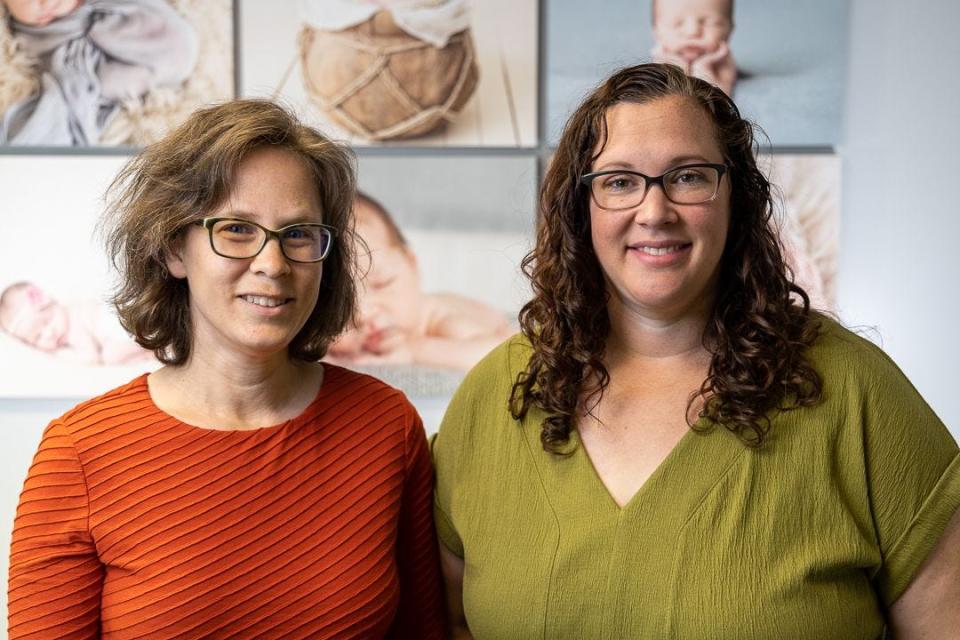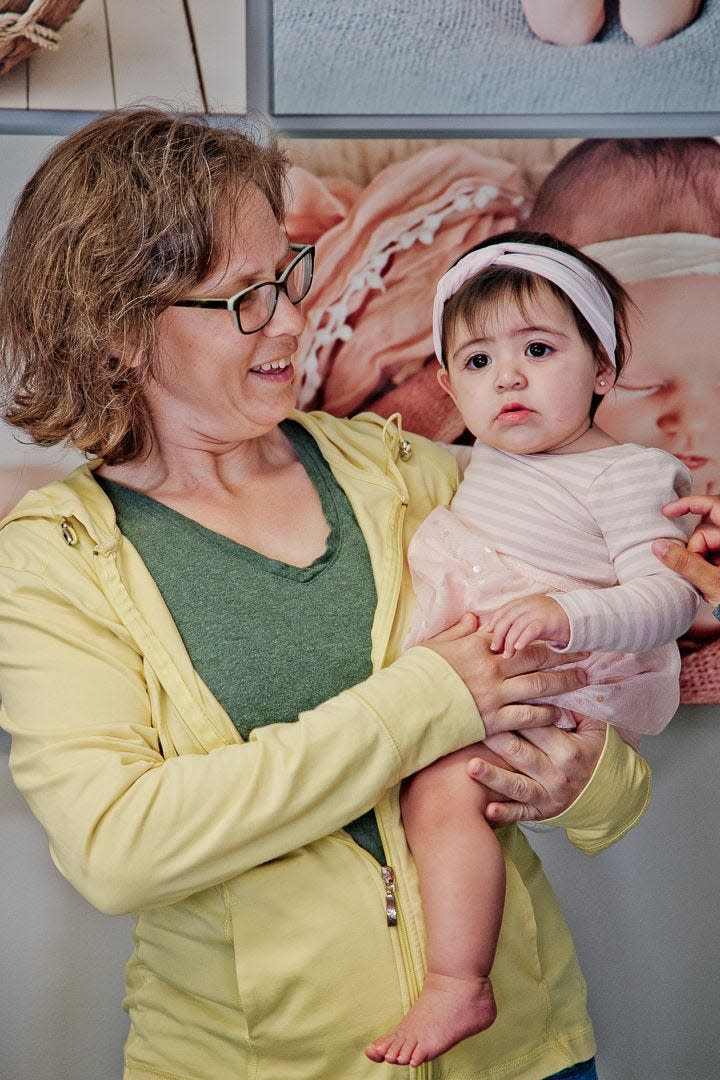2 Des Moines midwives say Iowa stymied their plan to open a birth center. Now they're suing
The service Emily Zambrano-Andrews and Caitlin Hainley offer looks very different from what happens in a hospital maternity ward.
The two women are certified nurse midwives and partners in the Des Moines Midwife Collective, where they offer services from lactation support to home births and postpartum care.
They specialize in helping women with low-risk pregnancies give birth in the comfort of their home, or a similarly comfortable setting such as a hotel or friend's house.
"Women who are choosing home birth or birth center birth, they're not looking at the hospitals as the alternative," said Jim Manley, an attorney with Pacific Legal Foundation who is representing the women. "They're really not contemplating a hospital birth. They want to give birth in this home-like environment. The best place to do that would be a birth center."
Hainley and Zambrano-Andrews want to open such a birth center in Des Moines, Iowa — essentially repurposing a single-family house with tubs and other equipment needed for births in a comfortable, home-like atmosphere. They've already picked out several "perfect" locations, Manley said.
But because birth centers are considered competitors to hospital maternity wards under Iowa law, they must first receive what is known as a "certificate of need" from the state, a process that allows all their competitors to weigh in on whether or not their project should be permitted.
That application process, Manley said, is hugely expensive and "designed to fail." Instead, the two midwives are suing the Iowa Health Facilities Council, the state board that issues certificates of need, and asking the court to declare the law unconstitutional.
"This unconstitutional process amounts to a 'competitor’s veto,' giving established businesses, rather than expectant mothers, the right to determine what options are available for giving birth," according to the complaint, filed Jan. 12 in Polk County district court. "This competitor’s veto doesn’t serve health or safety; it serves only the unconstitutional end of economic protectionism."

What do 'certificate of need' laws do?
In theory, certificate of need laws are meant to protect the public. According to the National Conference of State Legislatures, "CON programs primarily aim to control health care costs by restricting duplicative services and determining whether new capital expenditures meet a community need."
To that end, an entrepreneur or new entrant in a local market must win the approval of the Health Facilities Council. The process includes notifying all nearby competitors and holding public hearings where "affected persons" — including competitors — can testify.
Any party unhappy with the council's resulting decision, can request a rehearing or launch an appeal.
Iowa requires certificates of need for all "institutional health services," including birth centers, and the process has proved the undoing of numerous proposed projects.
The state council rejected a proposed $230 million University of Iowa hospital campus in North Liberty in 2021 and has blocked previous birth center proposals, including from a Sioux City midwife who later testified in support of failed legislative efforts to change the law.
In part because of CON requirements, there is only one free-standing birth center in Iowa. That location, in Des Moines, will be closing in February.
Supporters of the law, unsurprisingly, include existing health care providers.
After the North Liberty project was denied, a group of MercyOne executives from across the state wrote to the Register arguing the law "is designed to ensure any growth or changes in the state’s health care system are necessary and cost-effective."
Is the 'certificate of need' law unconstitutional?
Thirty-five states have CON laws governing health care facilities, according to the National Conference of State Legislators.
Several have been challenged in court, including another pending case brought by Pacific Legal Foundation involving birth centers in Georgia. Manley said the nonprofit law firm believes CON laws inappropriately interfere with competition, to the detriment of consumers.
"We think that government bureaucrats are in a poor position to decide whether a business should be allowed to compete," he said. "It wouldn't make any sense for the state of Iowa to decide whether McDonald's should be able to open up across the street from Burger King. The consumer decides who wins in that fight."

Other states have used the same regulatory model in other industries. Manley said his firm has successfully challenged a Kentucky law requiring certificates of need for "household goods movers" and is suing over another Kentucky law restricting ambulance providers.
They've also sued Montana over a law requiring certificates of need for "junk haulers."
"That's sort of how these things go sometimes: the more specific the industry, the more concentrated the lobbying efforts are, therefore the more restrictive the certificate of need laws are," Manley said.
Iowa, Zambrano-Andrews and Hainley note in their complaint, has an acute need for maternity services.
A University of Iowa report last year counted 41 birthing units around the state that have closed since 2000, leaving many counties with no local provider, and found worse prenatal care and outcomes for women in those counties.
The new Iowa lawsuit ask the court to rule that "the challenged laws are invalid, unenforceable, and void," and grant a permanent injunction against their enforcement.
The state has not filed a response the the petition in court.
William Morris covers courts for the Des Moines Register. He can be contacted at wrmorris2@registermedia.com, 715-573-8166 or on Twitter at @DMRMorris.
This article originally appeared on USA TODAY: Des Moines midwives sue over Iowa certificate of need law

 Yahoo Movies
Yahoo Movies 
